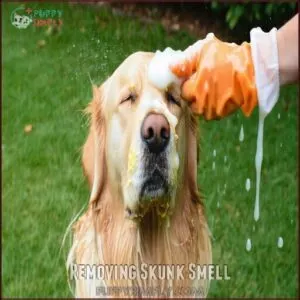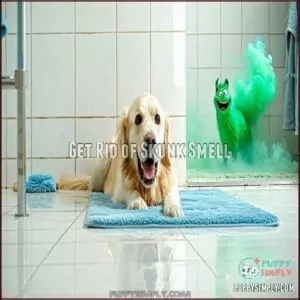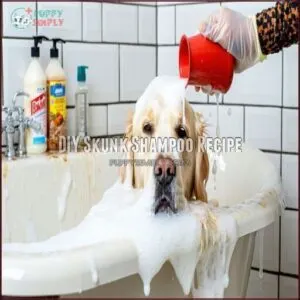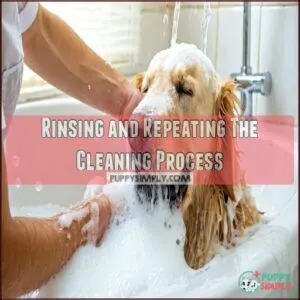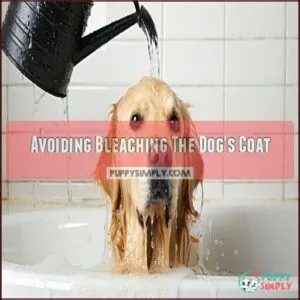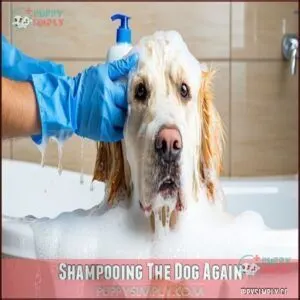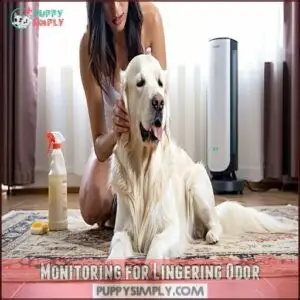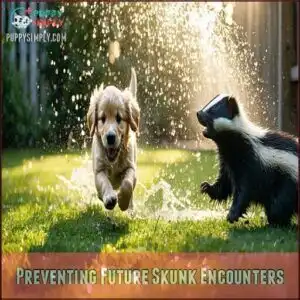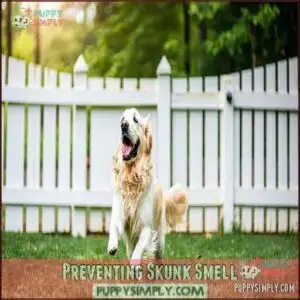This site is supported by our readers. We may earn a commission, at no cost to you, if you purchase through links.
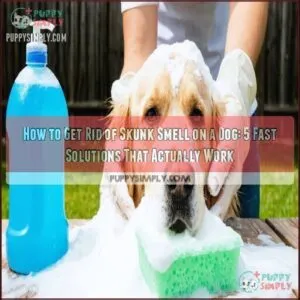
Keep your pup outside, check their eyes for irritation, then apply the mixture wearing gloves. Work it thoroughly into their coat, avoiding eyes and mouth.
Rinse completely after 5 minutes (don’t leave it longer—it can bleach fur), then follow with regular dog shampoo.
For stubborn smells, you might need to repeat the process. Commercial de-skunking products work too.
Remember, the fresher the spray, the easier it is to eliminate that eye-watering stench.
Table Of Contents
- Key Takeaways
- Removing Skunk Smell
- Get Rid of Skunk Smell
- Skunk Odor Removal Process
- Post Cleaning Care Tips
- Preventing Skunk Smell
- Frequently Asked Questions (FAQs)
- How do you get a skunk smell out of a dog?
- How to get rid of skunk smell on a dog?
- Can a skunk spray a dog?
- How do you remove skunk odor from clothes?
- What neutralizes skunk odor on a dog?
- How long does a skunk smell last on a dog?
- What neutralizes the smell of skunk?
- Does Dawn remove skunk smell from dogs?
- What neutralizes skunk smell?
- What cancels out skunk smell?
- Conclusion
Key Takeaways
- Act quickly with a proven homemade solution: mix 1 quart hydrogen peroxide (3%), ¼ cup baking soda, and 2 teaspoons dish soap, apply it to your dog’s dry coat for 5 minutes, and rinse thoroughly.
- Keep your dog outside during treatment, check for eye irritation, wear gloves while applying the solution, and avoid getting it in their eyes or mouth.
- After initial treatment, follow up with regular dog shampoo, towel-dry your pet completely, and monitor for lingering odor which may persist for up to two weeks.
- Prevent future encounters by keeping your dog leashed during dawn and dusk, securing trash containers, using deterrents like motion-activated lights, and sealing potential entry points around your property to prevent future encounters.
Removing Skunk Smell
You’ll need to act quickly when your dog has been sprayed by a skunk to prevent the odor from setting into their fur.
The powerful smell comes from thiols, sulfurous chemicals that skunks produce in their anal glands as a defense mechanism, which can travel up to 15 feet and often hit dogs directly in the face.
Initial Response and Safety Measures
When your dog gets skunked, act fast.
Keep them outside to prevent that pungent skunk spray from spreading through your home.
Check their eyes for redness or irritation—skunk spray can cause short-term blindness and needs immediate eye flushing with cool water or veterinary eyewash.
Monitor for signs of distress and consider a veterinary consult if your dog was sprayed directly in the face.
Safe solutions start with proper containment.
Checking for Eye and Mouth Irritation
Many skunk encounters result in face sprays, so checking your dog’s eyes and mouth is critical. Look for eye redness, tearing, or pawing at the face – signs of irritation requiring immediate attention.
Flush eyes with safe eyewash or cool water for 5 minutes. Examine the mouth for burns or excessive drooling.
Understanding puppy eye development can help you identify potential issues early on. If you notice any distress signs like lethargy or difficulty breathing, contact your vet immediately for immediate attention.
Keeping The Dog Outside
When dealing with a skunked dog, keeping them outside is your first line of defense against odor containment issues.
Don’t let your furry friend inside until they’ve been treated – skunk smell on dog can quickly permeate furniture, carpets, and curtains.
Set up a temporary kennel with weather protection if needed. This limits exposure to your home while you prepare treatment.
Remember proper waste management for any cleaning materials.
Get Rid of Skunk Smell
Panic sets in when your furry friend returns home reeking of skunk spray.
Panic sets in when your furry friend returns home reeking of skunk spray.
To get rid of skunk smell on your dog effectively, you’ll need to act quickly with the right solutions.
The most effective approaches combine thorough cleaning with odor-neutralizing ingredients.
You can choose between DIY solutions using household items or commercial products specifically formulated for skunk odor.
The key is to break down the thiols—those stubborn chemicals in skunk spray that cause the infamous smell.
Don’t waste time with myths like tomato juice; they simply don’t work.
Instead, focus on proven remedies containing hydrogen peroxide, baking soda, or specialized enzymes found in commercial cleaners.
Remember that completely eliminating the smell might require multiple treatments, so be patient.
The best skunk cleaner will depend on how directly your dog was sprayed and your access to ingredients.
Skunk Odor Removal Process
You’ll need to act quickly to neutralize the skunk’s powerful thiols before they bond with your dog’s fur.
Working with either a homemade solution of hydrogen peroxide, baking soda, and dish soap or a commercial skunk odor remover, you can effectively break down these stubborn compounds and restore your furry friend to their non-offensive state.
DIY Skunk Shampoo Recipe
Whip up this powerful DIY skunk shampoo recipe when your furry friend has an unfortunate encounter.
Mix 1 quart of 3% hydrogen peroxide with ¼ cup baking soda and 1 teaspoon dish soap. Apply immediately to dry fur, working it in thoroughly while avoiding eyes and mouth.
Let sit for 5 minutes, then rinse completely. The solution breaks down skunk oils effectively but don’t store it—it can explode in closed containers.
You can also find skunk shampoo products online for an alternative to this DIY shampoo recipe.
Using Commercial Skunk Odor Removers
Three specialized commercial products offer powerful skunk odor neutralization for your dog.
Products like Nature’s Miracle Skunk Odor Remover, SkunkAway, and Zero Odor break down skunk oils instead of masking them.
You’ll find these effective solutions at pet stores and general retailers. For best results, follow the application methods on the label carefully.
Veterinarians often recommend these commercial formulas when DIY remedies aren’t cutting through stubborn dog skunk odor. Some pet owners also use air purifiers for odors to further eliminate smells.
Rinsing and Repeating The Cleaning Process
After applying your dog skunk odor solution, rinse thoroughly with lukewarm water until all residue is gone.
Water temperature matters—too hot can set the smell, while too cold reduces effectiveness.
If odor persistence is noticeable, don’t hesitate to repeat application of your deskunking dog remedy. For stubborn odors, consider using a specialized shampoo product.
Continue this cycle of applying and rinsing until the skunk smell on dog diminishes.
Different drying methods come after the skunked dog remedy works.
Avoiding Bleaching The Dog’s Coat
When treating skunk smell, timing is vital to avoid bleaching your dog’s coat.
Don’t leave peroxide-based solutions on for more than 5 minutes, especially on dark coats.
The 3% peroxide concentration is safe when used properly.
After application, make certain thorough rinsing to prevent residual chemicals from damaging fur.
For sensitive or colored fur, consider alternative cleaners specifically formulated for skunk smell removal that won’t affect your dog’s natural coloring.
Post Cleaning Care Tips
After removing the worst of the skunk smell, you’ll need to take a few extra steps to guarantee your dog stays comfortable and odor-free.
You’ll want to follow up with regular dog shampoo, thorough towel-drying, and careful monitoring for any lingering smell that might require additional treatment.
Shampooing The Dog Again
After treating your dog with the skunk odor neutralizer, you’ll need a second shampoo to remove any residual solution.
Use a regular dog shampoo and work it thoroughly into your pet’s coat. This step helps eliminate lingering skunk smell while protecting your dog’s skin.
Consider using a specialized shampoo product for best results.
Follow with a deep conditioner to restore moisture after the harsh cleaning process. Thorough rinsing is critical—leave no product behind that could irritate your furry friend’s skin.
Towel-Drying The Dog
After the thorough cleaning process, properly towel-drying your dog is vital for both comfort and preventing lingering skunk odor. Choose an absorbent towel to remove excess moisture from your dog’s coat following the skunk spray removal process.
For effective dog skunk treatment post-towel care, consider the following steps:
- Use firm, gentle pressure rather than rubbing, which can tangle fur
- Pay special attention to paw pads and belly areas
- Have multiple dry towels ready for thorough indoor drying, preventing chilling.
To guarantee a comfortable experience, consider using a dog-specific shampoo during the cleaning process, ensuring your dog’s comfort and proper care.
Monitoring for Lingering Odor
After towel-drying your dog, you’ll need to monitor for lingering skunk odor. Even after treatment, some smell may persist for up to two weeks.
When your dog gets wet or humid, the skunk smell might resurface. Daily sniff tests help track dog odor removal progress.
| Odor Location | Check Method | Action Needed |
|---|---|---|
| Fur | Spot checks | Repeated cleaning |
| Indoor air | Air quality | Open windows |
| Deep-set odor | Professional help | Specialized products |
Preventing Future Skunk Encounters
While monitoring for lingering odor, you should also plan to prevent another smelly situation.
Once you’ve cleaned your dog, focus on keeping them skunk-free moving forward.
- Use consistent leash management during dawn and dusk when skunks are most active
- Install yard deterrents like motion-activated lights or sprinklers
- Secure your property by sealing entry points under decks or sheds
- Improve your dog’s recall training so they’ll come when called if a skunk appears
These prevention tactics will help you avoid the frustration of another de-skunking adventure. Remember, supervised outdoor time is your best defense against unwanted skunk encounters, and keeping your dog skunk-free requires consistent effort to prevent another smelly situation, making prevention key.
Preventing Skunk Smell
You can save yourself the hassle of late-night emergency baths by taking simple steps to prevent skunk encounters in the first place.
Keeping your dog on a leash during walks, securing trash containers, and sealing potential entry points around your property will substantially reduce the chances of your furry friend needing another de-skunking session.
This approach is straightforward and effective, emphasizing the importance of preventive measures to avoid unpleasant situations, making simple steps a key part of the solution.
Leash Training and Avoidance
Leash discipline is your first line of defense against skunk encounters.
Keep your dog on a leash during dawn and dusk when skunks are most active. Strengthen recall training so your dog responds immediately to commands in skunk habitats.
Consider adding nighttime visibility accessories when walking after dark.
Understanding skunk scent tracking patterns helps you avoid areas where dogs commonly get sprayed, which is crucial for maintaining leash discipline.
Using Skunk Deterrents and Secure Trash
Most skunk encounters happen because these critters are attracted to your property.
Keep skunks away with these proven deterrents:
- Secure trash cans with tight-fitting, locking lids
- Place natural repellents like vinegar-water solutions around property boundaries
- Install motion sensor lights that startle skunks when activated
- Use heavy metal trash cans with bungee cords to prevent tipping
Never leave pet food outside overnight—it’s like sending skunks a dinner invitation.
Consider that a neighbor’s dog might bark due to territorial and protective instincts, drawing skunks to your yard, which can be a significant skunk encounter issue, and it is crucial to address the root cause of these skunk encounters to keep them away, and using proven deterrents can be effective.
Sealing Entry Points to Prevent Skunks
After sunset, skunks seek sheltered spaces around your property.
Seal foundation cracks with concrete or caulk to block these unwanted guests. Install secure decking and under-house barriers to eliminate potential dens.
Add chimney caps to prevent rooftop entry. Don’t forget shed proofing—these structures often provide perfect skunk habitats.
Combine these physical barriers with motion sensor lights and proper fencing for thorough skunk prevention that keeps your dog safe.
Frequently Asked Questions (FAQs)
How do you get a skunk smell out of a dog?
Mix hydrogen peroxide, baking soda, and dish soap to neutralize skunk odor.
Apply to your dog’s dry fur, avoiding eyes and mouth.
Let sit briefly, rinse thoroughly, and follow with regular dog shampoo, which helps to neutralize the skunk odor completely.
How to get rid of skunk smell on a dog?
You’re facing a hair-raising stink bomb! Mix 1 quart hydrogen peroxide with 1/4 cup baking soda and 1 teaspoon dish soap. Apply to dry fur, wait 5 minutes, rinse thoroughly, then shampoo.
Can a skunk spray a dog?
Yes, a skunk can spray your dog.
They’ll aim for the face and can shoot their potent liquid up to 15 feet away as a defense mechanism.
It’s a direct hit you won’t soon forget!
How do you remove skunk odor from clothes?
Those stinky clothes can feel like unwanted souvenirs.
Wash them with regular laundry detergent and ½ cup baking soda.
You’ll need to run them through the washer at least once, maybe twice.
What neutralizes skunk odor on a dog?
A mixture of hydrogen peroxide, baking soda, and dish soap effectively neutralizes skunk odor on your dog.
You’ll need to apply it thoroughly, rinse well, and possibly repeat for stubborn smells, which can be a stubborn process to completely eliminate the odor.
How long does a skunk smell last on a dog?
Like a lingering memory, skunk smell can last on your dog for up to three weeks without treatment.
You’ll notice it gradually fading after proper cleaning, but some subtle traces might remain for 14-21 days, which can be considered a lingering memory.
What neutralizes the smell of skunk?
Hydrogen peroxide mixed with baking soda and dish soap effectively neutralizes skunk odor by breaking down the thiols.
You’ll also find commercial skunk removers work well.
White vinegar diluted with water offers a milder alternative.
Does Dawn remove skunk smell from dogs?
Dawn dish soap alone won’t eliminate skunk smell.
You’ll need to mix it with hydrogen peroxide and baking soda for an effective solution.
Dawn helps break down oils in skunk spray but isn’t powerful enough by itself to be a complete solution.
What neutralizes skunk smell?
Over 70% of skunk encounters happen at night.
You’ll need a mixture of hydrogen peroxide, baking soda, and dish soap to neutralize thiols in skunk spray.
Commercial skunk odor removers work well too.
What cancels out skunk smell?
A mixture of hydrogen peroxide, baking soda, and dish soap effectively neutralizes skunk odor.
You’ll need to apply this solution to your dog’s dry fur, avoiding their eyes and mouth, then rinse thoroughly.
Conclusion
Finally, knowing how to get rid of skunk smell on a dog means you’ll never be caught off guard by these striped stinkers.
The hydrogen peroxide solution works like a charm, but timing is key.
Act fast, protect your dog’s eyes, and don’t hesitate to repeat if needed.
You can also keep commercial products on hand if your pup is prone to such aromatic adventures.
With these tools, you’ll turn that eye-watering odor into a distant memory.
- https://vcahospitals.com/know-your-pet/skunk-spray-and-your-dog
- https://www.merckvetmanual.com/toxicology/toxicologic-hazards-in-the-workplace/hydrogen-sulfide-as-a-veterinary-workplace-hazard
- https://www.humaneworld.org/en/resources/de-skunking-your-dog
- https://www.vet.cornell.edu/departments-centers-and-institutes/riney-canine-health-center/canine-health-information/what-do-when-your-dog-gets-skunked
- https://www.petmd.com/dog/general-health/how-to-get-skunk-smell-spray-off-a-dog

